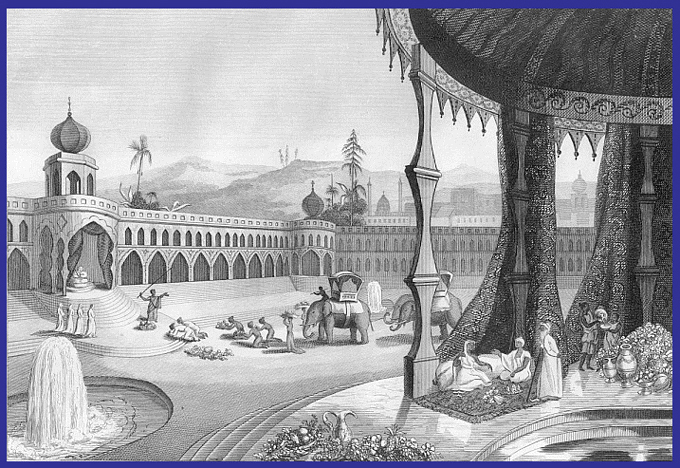The Brahmanas
BY: SUN STAFF

Making Offerings to Lord Brahma
Steel Engraving, c. 1840
Sep 18, CANADA (SUN) — A division of Vedic sruti.
The Brahmanas are commentaries on the four Vedas - Rgveda, Yajurveda, Samaveda, and Atharvaveda - which detail the proper performance of rituals. Each Vedic shakha (school) had its own Brahmana, and it is not known how many of these texts existed during the Mahajanapadas period, during the time of the Great Kingdoms. About twenty Brahmana are known to have survived into modern times.
The Brahmanas were seminal in the development of later Indian thought and scholarship, including Hindu philosophy, predecessors of Vedanta, law, astronomy, geometry, linguistics (Panini), the concept of Karma, and varnasrama. Some Brahmanas contain sections that are Aranyakas or Upanishads in their own right.
Each Brahmana is specifically associated with one of the four Vedas, and within the tradition of that Veda, is associated with a particular shakha or school.
The Rigveda
Shakala shakha: Aitareya Brahmana, also known as the Ashvalayana Brahmana, is believed to have been composed around 600 BC, and is perhaps the oldest Brahmana. It deals principally with Soma sacrifices.
Bashkala shakha: Kaushitaki Brahmana or Sankhayana Brahmana
The Samaveda
Kauthuma: Tandyamaha or Pancavimsa
Brahmana, Sadvimsa Brahmana
Samavidhana Brahmana
Arseya Brahmana
Devatadhyaya or Daivata Brahmana
Mantra or Chandogya Brahmana
Samhitopanisad Brahmana
Vamsa Brahmana
Jaiminiya Brahmana
Jaiminiya Arseya Brahmana
Jaiminiya Upanishad Brahmana: Jaiminiya Upanishad is considered a very early Upanishad, together with the Brhadaranyaka and Chandogya Upanishads. It is not to be confused with the Jaiminiya Brahmana, which is an actual Brahmana commentary of the Jaiminiya school.
The Yajurveda
Krishna: The Brahmana sections are integrated into the Samhitas:
- Maitrayani Samhita and an Aranyaka
- Caraka Katha Samhita - The Katha school has an additional fragmentary Brahmana and Aranyaka
- Kapisthalakatha Samhita, and a few fragments of its Brahmana
- Taittiriya Samhita - The Taittiriya school has an additional Taittiriya Brahmana and Aranyaka, as well as the late Vedic Vadhula Anvakhyana.
The Taittiriya Shakha is a notable shakha ("rescension") of the Black Yajurveda. The Vishnu Purana attributes it to a pupil of Yaska named Tittiri. It is most prevalent in South India. The shakha consists of:
- The Taittiriya Samhita, which consists of 8 books or kaandas, subdivided in chapters or prapathakas, further subdivided into individual hymns. Some individual hymns in this Samhita have gained particular importance in constitute the Shri Rudram Chamakam, and one is the Shaivaite Tryambakam mantra.
- The Taittiriya Brahmana (having three kaandas) - Part of kathaka shakha brahmana is also included in this shakha.
- Taittiriya Aranyaka (having seven prashnas):
- The Taittiriya Upanishad (having three prashnas or vallis - Sheeksha valli, Ananda valli and Bhrigu valli)
- The Mahanarayana Upanishad
- The Apastamba Shrautasutra
The Taittiriya Upanishad and Mahanarayana Upanishad are considered to be the seventh, eighth, ninth and tenth prashnas of the Taittiriya Aaranyaka. The words 'prapaathaka' and 'kaanda' (meaning sections) are interchangeably used in the Vedic literature. 'Prashna' and 'valli' refer to sections of the Aaranyaka.
Shukla
Shatapatha Brahmana, Madhyadina recension - The Shatapatha Brahmana survives in two recensions, Madhyandina and Kanva, with the former having the eponymous 100 brahmanas in 14 books, and the latter 104 brahmanas in 17 books. Linguistically, it belongs to the Brahmana period of Vedic Sanskrit, dated to the first half of the 1st millennium BCE (Iron Age India). It includes text regarding the creation and the Deluge of Manu. It also describes in great detail the preparation of altars, ceremonial objects, ritual recitations, and the Soma libation, along with the symbolic attributes of every aspect of the rituals.
The 14 books of the Madhyandina recension can be divided into two major parts. The first 9 books have close textual commentaries, often line by line, of the first 18 books of the corresponding Samhita of the Yajurveda. The following 5 books cover supplementary and ritualistically newer material, besides including the celebrated Brhadaranyaka Upanishad as most of the 14th and last book.
- Kanva: Shatapatha Brahmana, Kanva recension
The Atharvaveda
References:
Arthur Berriedale Keith, Rigveda Brahmanas (1920); reprint: Motilal Banarsidass (1998) ISBN-13: 978-8120813595.
A. C. Banerjea, Studies in the Brahmanas, Motilal Banarsidass (1963)
E. R. Sreekrishna Sarma, Kaunitaki-Brahmana, Wiesbaden (1968, comm. 1976).
Dumont, P.E. [translations of sections of TB 3 ]. PAPS 92 (1948), 95 (1951), 98 (1954), 101 (1957), 103 (1959), 104 (1960), 105 (1961), 106 (1962), 107 (1963), 108 (1964), 109 (1965), 113 (1969).
Caland, W. Uber das Vadhulasutra; Eine zweite / dritte / vierte Mitteilung uber das Vadhulasutra. [= Vadhula Sutra and Brahmana fragments (Anvakhyana)]. Acta Orientalia 1, 3-11; AO II, 142-167; AO IV, 1-41, 161-213; AO VI, 97-241.1922. 1924. 1926. 1928. [= Kleine Schriften, ed. M. WItzel. Stuttgart 1990, pp. 268-541]
Caland. W. Pancavimsa-Brahmana. The Brahmana of twenty five chapters. (Bibliotheca Indica 255.) Calcutta 1931. Repr. Delhi 1982.
Bollée, W. B. Sadvinsa-Brahmana. Introd., transl., extracts from the commentaries and notes. Utrecht 1956.
Bodewitz, H. W. Jaiminiya Brahmana I, 1-65. Translation and commentary with a study of the Agnihotra and Pranagnihotra. Leiden 1973.
Bodewitz, H. W. The Jyotistoma Ritual. Jaiminiya Brahmana I,66-364. Introduction, translation and commentary. Leiden 1990.
Gaastra, D. Das Gopatha Brahmana, Leiden 1919
Bloomfield, M. The Atharvaveda and the Gopatha-Brahmana (Grundriss der Indo-Arischen Philologie und Altertumskunde II.1.b) Strassburg 1899
Source: Wikipedia.
